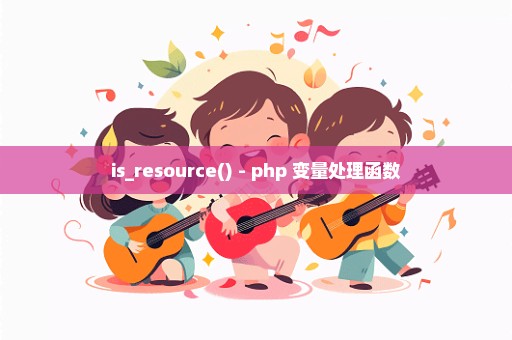is_resource() - php 变量处理函数
is_resource()
(PHP 4, PHP 5, PHP 7)
检测变量是否为资源类型
描述
is_resource(mixed $var): bool如果给出的参数$var是resource类型,is_resource()返回TRUE,否则返回FALSE。

查看resource类型文档获取更多的信息。
I was recently trying to loop through some objects and convert them to arrays so that I could encode them to json strings. I was running into issues when an element of one of my objects was a SoapClient. As it turns out, json_encode() doesn't like any resources to be passed to it. My simple fix was to use is_resource() to determine whether or not the variable I was looking at was a resource. I quickly realized that is_resource() returns false for two out of the 3 resources that are typically in a SoapClient object. If the resource type is 'Unknown' according to var_dump() and get_resource_type(), is_resource() doesn't think that the variable is a resource! My work around for this was to use get_resource_type() instead of is_resource(), but that function throws an error if the variable you're checking isn't a resource. So how are you supposed to know when a variable is a resource if is_resource() is unreliable, and get_resource_type() gives errors if you don't pass it a resource? I ended up doing something like this: The @ operator suppresses the errors thrown by get_resource_type() so it returns null if $possibleResource isn't a resource. I spent way too long trying to figure this stuff out, so I hope this comment helps someone out if they run into the same problem I did.
Try this to know behavior: It will be shown as... [Check Valid Resource] (bool)$resource => TRUE get_resource_type($resource) => stream is_resoruce($resource) => TRUE [Check Released Resource] (bool)$resource => TRUE get_resource_type($resource) => Unknown is_resoruce($resource) => FALSE [Check NULL] (bool)$resource => FALSE get_resource_type($resource) => FALSE Warning: get_resource_type() expects parameter 1 to be resource, null given in ... on line 10 is_resoruce($resource) => FALSE
Note that is_resource() is unreliable. It considers closed resources as false: That's the reason why some other people here have been confused and devised some complex (bad) "solutions" to detect resources... There's a much better solution... In fact, I just showed it above, but here it is again with a more complete example: So how do you check if something is a resource? Like this! How it works: - An active resource is a resource, so check that first for efficiency. - Then branch to check what the variable is NOT: - A resource is never NULL. (We do that check via `!== null` for efficiency). - A resource is never Scalar (int, float, string, bool). - A resource is never an array. - A resource is never an object. - Only one variable type remains if all of the above checks succeeded: IF it's NOT any of the above, then it's a closed resource! Just surfed by and saw the bad and hacky methods other people had left, and wanted to help out with this proper technique. Good luck, everyone! PS: The core problem is that is_resource() does a "loose" check for "living resource". I wish that it had a $strict parameter for "any resource" instead of these user-workarounds being necessary.
鹏仔微信 15129739599 鹏仔QQ344225443 鹏仔前端 pjxi.com 共享博客 sharedbk.com
免责声明:我们致力于保护作者版权,注重分享,当前被刊用文章因无法核实真实出处,未能及时与作者取得联系,或有版权异议的,请联系管理员,我们会立即处理! 部分文章是来自自研大数据AI进行生成,内容摘自(百度百科,百度知道,头条百科,中国民法典,刑法,牛津词典,新华词典,汉语词典,国家院校,科普平台)等数据,内容仅供学习参考,不准确地方联系删除处理!邮箱:344225443@qq.com)
图片声明:本站部分配图来自网络。本站只作为美观性配图使用,无任何非法侵犯第三方意图,一切解释权归图片著作权方,本站不承担任何责任。如有恶意碰瓷者,必当奉陪到底严惩不贷!
内容声明:本文中引用的各种信息及资料(包括但不限于文字、数据、图表及超链接等)均来源于该信息及资料的相关主体(包括但不限于公司、媒体、协会等机构)的官方网站或公开发表的信息。部分内容参考包括:(百度百科,百度知道,头条百科,中国民法典,刑法,牛津词典,新华词典,汉语词典,国家院校,科普平台)等数据,内容仅供参考使用,不准确地方联系删除处理!本站为非盈利性质站点,本着为中国教育事业出一份力,发布内容不收取任何费用也不接任何广告!)
 百科狗
百科狗



